Friday, March 21, 2014
Kawasaki KX250F 2011 Review
Motorcycle.com became acquainted with the 2011 KX250F at the North American press launch at Budds Creek. Engineers were excited to show off their hard work; the new KX250F received over 30 changes from the previous year, including the biggest of them all, fuel injection.

We liked the 2010 model so much we were afraid Kawasaki was “fixing what ain’t broken,” so it was interesting to collect feedback from Greg Jones, the son of three-time AMA MX Champ Gary Jones. We left Budds Creek enthusiastic about the new machine, but were still a little skeptical. Let’s face it; a pro rider on a world-class motocross track, surrounded by factory-trained technicians, isn’t an accurate representation of how a bike will work in the real world.
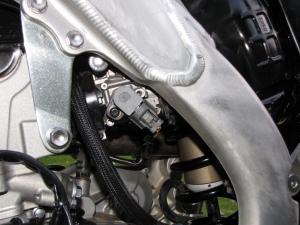 Before we dig into the 2011 KX250F a techno refresher is in order. The Kehin battery-less fuel injection system is just like the one used on the KX450F, only with different calibration. The ECU is tunable with software from Kawasaki, allowing riders to adjust the powerband to their riding style and track conditions. A gear position sensor, an air pressure sensor, a water temp sensor and an air pressure sensor are used to optimize the air/fuel ratio. The system also incorporates a vehicle down sensor, designed to shut the engine off if you crash.
Before we dig into the 2011 KX250F a techno refresher is in order. The Kehin battery-less fuel injection system is just like the one used on the KX450F, only with different calibration. The ECU is tunable with software from Kawasaki, allowing riders to adjust the powerband to their riding style and track conditions. A gear position sensor, an air pressure sensor, a water temp sensor and an air pressure sensor are used to optimize the air/fuel ratio. The system also incorporates a vehicle down sensor, designed to shut the engine off if you crash. On paper the new engine makes slightly more mid to top-end power than last year. In the name of increased reliability the 2011 KX250F engine also has new cams, valve springs, a new piston, a new cylinder, a new crankshaft, revised gear ratios and a new gearshift mechanism. The air intake volume and the exhaust header length were massaged to improve low-rpm response, and the new muffler was designed to meet AMA noise standards.
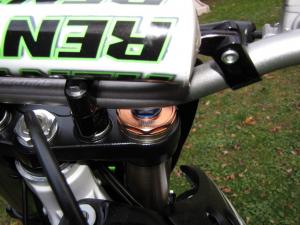 It seems weird to only have one fork spring, but the new Showa Separate Function Fork (SFF) system has adjustable preload, compression and rebound damping and weighs 1.5 pounds less than the old fork. It also has less stiction and is less expensive to service or modify. The tripleclamp offset has been reduced to 22.5 mm in the quest for increased front wheel traction.
It seems weird to only have one fork spring, but the new Showa Separate Function Fork (SFF) system has adjustable preload, compression and rebound damping and weighs 1.5 pounds less than the old fork. It also has less stiction and is less expensive to service or modify. The tripleclamp offset has been reduced to 22.5 mm in the quest for increased front wheel traction. The shock is Kashima treated to improve smoothness, and has revised damping settings for 2011 to better match the new fork. Leaving no stone unturned, Kawasaki engineers changed the engine mounts from stiff aluminum to more flexible steel as a way to gain lighter handling and better cornering! The saddle has a new cover with increased side grip. Kawasaki says the bike weighs 232.7 pounds, but it feels lighter than that when you’re moving it around in the garage.
We knew from our time at Budds Creek how well the KX250F worked on a Pro-level MX track, so we spent most of our ‘real-world’ test doing other stuff. We ripped around on around first and second gear singletrack like an off-road racer, rode fast Euro-style grass tracks like an ISDE racer and even searched out Endurocross-type obstacles to hop over.
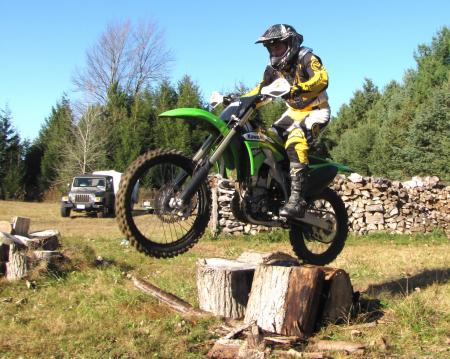 It’s no wonder KX250Fs have been successful in Endurocross racing! Smooth low-end power and a well-controlled midrange hit inspire riders to go out and hop over things. It’s no wonder KX250Fs have been successful in Endurocross racing! Smooth low-end power and a well-controlled midrange hit inspire riders to go out and hop over things. |
Back in 2010, despite having a carburetor, we praised how easily the KX250F started. Well don’t worry; with fuel injection the KX-F starts every bit as well as last year. When cold simply pull the choke/idle speed knob, roll the bike over a couple times to prime the EFI system and then give it a full kick. Hot? One full, solid kick and she lights up almost every time. At typical sound test rpm the new muffler is pleasingly quiet. Go beyond that, with a good twist of throttle, and the KX250F is just as loud and raspy sounding as ever. Over the course of a week our test bike grew louder as muffler packing, our hearing and our neighbor’s patience, deteriorated. Thankfully the aftermarket is full of quiet performance pipes these days.
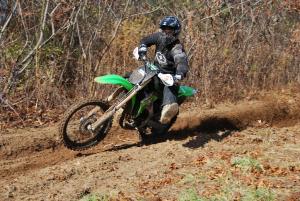 EFI lets the engine pull smoothly off the bottom then revs quickly and barks into a stellar midrange hit. It’s almost two-stroke-like. For an experienced rider that snap is useful on the motocross track, and with a practiced clutch finger, it works off the track too. At higher RPM the power tapers until you hit the rev limiter. No, the KX250F is not the easiest to ride 250F ever but it is very likely the fastest. The fuel-injected engine never once flamed out, stalled, gurgled or did anything except run great.
EFI lets the engine pull smoothly off the bottom then revs quickly and barks into a stellar midrange hit. It’s almost two-stroke-like. For an experienced rider that snap is useful on the motocross track, and with a practiced clutch finger, it works off the track too. At higher RPM the power tapers until you hit the rev limiter. No, the KX250F is not the easiest to ride 250F ever but it is very likely the fastest. The fuel-injected engine never once flamed out, stalled, gurgled or did anything except run great. The close-ratio five-speed transmission has a good overall spread of gears and final drive gear ratio for most tracks. Trail riders or novices might want to gear it down a tooth or two, but since the Kawasaki engine is so smooth off idle it’s not much of an issue. The newly revised transmission had average action and had a nice light clutch feel, but about halfway through our test it became more difficult to shift gears under load for some reason. We never missed a shift but it took more toe effort than it did at first. The clutch itself remained flawless for the entire test period.
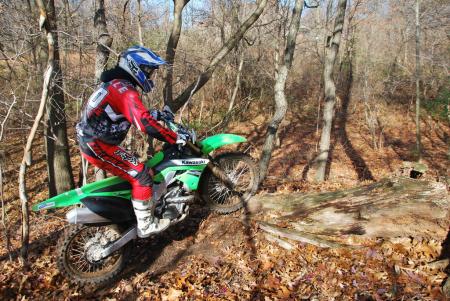 Hard charging motocross pros might find the fork too soft for some tracks, but its versatility really impressed us. Hard charging motocross pros might find the fork too soft for some tracks, but its versatility really impressed us. |
The new SFF front end worked well, if a bit soft for Pro riders, on the track. With stock damping adjustments but five clicks less preload the fork worked well on the trail also. Our test riders ranged from 150 to 200+ pounds, so we can conclude the SFF forks are not only versatile but also suit a wide range of riders. The SFF system also makes valving or spring rate changes relatively inexpensive compared to conventional motocross forks.
The shock also worked nicely, generating almost no whining from our test pilots. Typically motocross, it was a bit too firmly damped on high-speed compression for our slower testers in the woods, but overall it did a good job of absorbing both trail hack and moto leaps.
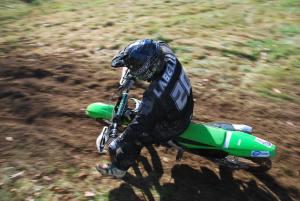 Ergonomically the KX250F feels a little thick for a 250F. It has a comfortable seat and a fairly wide fuel tank. Compared to some motocross bikes that are a little too hard edged to be truly comfortable, the KX-F feels almost like a trail bike. But this is a race bike, pure and simple. Unlike Honda’s CRF250R, which can sometimes trick you into thinking you’re aboard a play bike, the KX250F always feels like a racer. It is stable enough at speed, but despite the chassis changes the KX-F still doesn’t own the corners like an RM-Z. The brakes were excellent, and the entire KX250F package encourages you to ride faster.
Ergonomically the KX250F feels a little thick for a 250F. It has a comfortable seat and a fairly wide fuel tank. Compared to some motocross bikes that are a little too hard edged to be truly comfortable, the KX-F feels almost like a trail bike. But this is a race bike, pure and simple. Unlike Honda’s CRF250R, which can sometimes trick you into thinking you’re aboard a play bike, the KX250F always feels like a racer. It is stable enough at speed, but despite the chassis changes the KX-F still doesn’t own the corners like an RM-Z. The brakes were excellent, and the entire KX250F package encourages you to ride faster.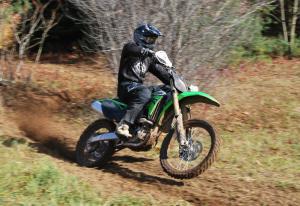 The bike comes with a plastic skid plate that is a nice addition for moto or for normal trail use, but is not strong enough for budding Endurocross racers. When we took our test bike trail riding we did nothing more than install Enduro Engineering handguards, but if we owned a KX250F we’d be installing more serious off-road armor, an o-ring chain and a quieter muffler.
The bike comes with a plastic skid plate that is a nice addition for moto or for normal trail use, but is not strong enough for budding Endurocross racers. When we took our test bike trail riding we did nothing more than install Enduro Engineering handguards, but if we owned a KX250F we’d be installing more serious off-road armor, an o-ring chain and a quieter muffler.Things our testers didn’t like were the obnoxious exhaust note, the noisy (but effective in shaking mud off the chain) serrated chain roller and the way the bike aged right before our eyes. It’s obvious we really like the KX250F. From our preview at Budd’s Creek we knew we liked it as a motocross bike, but now we also like it as a woods racer. So far it’s at the top of our list for 250F of the year. The KX250F is a great motocross bike, and when ridden aggressively will happily become a very effective new-school enduro racer.
Thanks to Kawasaki Canada for providing our test bike!
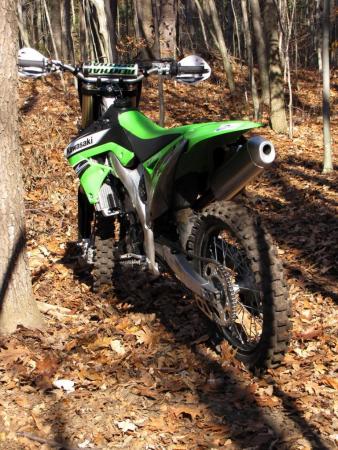 Top marks for engine performance, good suspension and average everything else add up to another winner for Kawasaki. Top marks for engine performance, good suspension and average everything else add up to another winner for Kawasaki. |